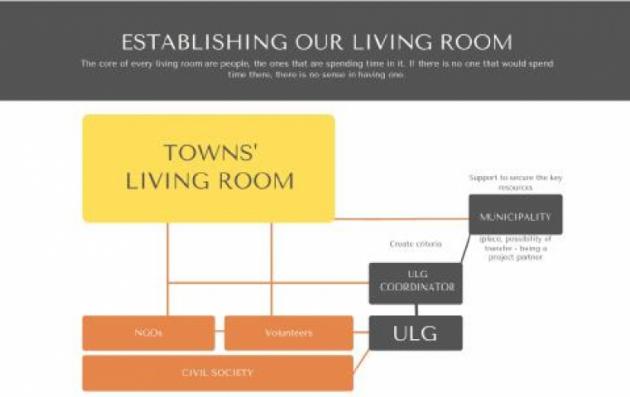Solutions offered by the good practice
Fostering the engagement of inhabitants who are not in paid employment but have access to skills and resources to help support those in need, builds the capacity of civil society to engage with often complex social problems in a structured way. Altena founded its NGO platform in 2008 and called it Stellwerk. The Stellwerk started without a budget. The municipality made available premises, paid the energy and cleaning bills, provided a minimum of administrative resources. Currently the Stellwerk has 8 volunteer workers who co-ordinate several hundred volunteers providing disability support, arts and music groups, home visiting and home care services, refugee integration and much more. The Stellwerk provides an essential channel of communication between civil society and municipality.
In February 2020, Idrija launched its new ‘Towns’ Living Room’: the municipality offered a vacant building to house a small ULG involving the heads of the city administration, active citizens, social services, development agency, public library and nursing home, local clubs and various associations.
The ‘Towns’ Living Room’ links organisations with interested citizens if needed, but it is a “by the people for the people’’ model. Activities have already included events on housing and building refurbishment, chess classes, evening of poetry, book presentation, reading of fairy tales for children, knitting evening to raise breast cancer awareness and many more. It hosts services, such as a municipality supported volunteer based free transport service for elderly people and a book corner provided by the local library.
Sustainable and integrated urban approach
For successful transfer of good practice, it connected and established cooperation across different departments of a municipality. As well as also it strengthened the connection between local actors, NGOs and municipality.
With the practice based on ‘people to people’ approach it also improves the quality of design and implementation of smaller local actions.
Good practice works when there is trust established between all different parties – municipality, NGOs/volunteers, institutions and citizens.
Participatory approach
The practice is based on people, NGOs, volunteers that are encouraged by ULG. The coordination between all the elements was done by ULG coordinator. It includes all important stakeholders and interested citizens which is essential part of success of a practice based on ‘’people to people’’ approach. It uses bottom-up approach which leads to that people actually want to be part of good practice and want to give to community because they are having opportunity to fulfil their wishes and they actually have a say in what will happen.
What difference has it made
After official opening of the premises of the NGO platform (the "Towns living room’’) volunteers started to turn up. Ideas are coming in all the time which means that people are actually engaging and doing things on their own. There is also a wide acceptance now in public. At the start there were a lot of opinions about "just another project’’ and now those opinions are different and more in a way "we really needed that’’ "it is nice to have a place where we can do something’’. A lot of ideas are already on the list to do, and everyone is more confident now. With less Covid-19 restrictions the "Town living room" was able to open up again which resulted in a rich monthly program with different activities organized as well as giving people a place to hang out a bit without organized activities.
Transferring the practice
Idrija was one of the seven European cities (besides Manresa Spain, Igoumenitsa Greece, Isernia Italy, Melgaço Portugal, Aluksne Latvia, Nyírbátor Hungary) of the Re-grow City Transfer Network, led by Altena, Germany, to transfer the URBACT Good Practice of Altena on finding opportunities in declining cities. Some of the cities were transferring the NGO platform while others the Pop-up shops.
This good practice has also been chosen as one of 5 URBACT National Practice Transfer Initiatives (NPTI) and will be transferred to 6 other Slovenian municipalities. The project is led by Slovenian NUP, with Tina Lisac as national expert.
Equipped by URBACT with a toolkit, the cities could learn from the good practice and also from each other.
Re-grow City deliberately focused on small and medium sized towns, because they face distinctive challenges in terms of constrained resources and limited technical capabilities when compared to larger cities. These constraints offer opportunities, however, for example robust social networks with high levels of ‘social capital’ and short decision making routes that speed up the adoption of untested or controversial methods. Taken together with the resources and skills local people have, shrinking cities are places of opportunity and can demonstrate considerable resilience even where they face severe constraints.
As a side-outcome of the Re-Grow City network, in May 2021 the new pan-European network ReGrow Towns has been established. This is aimed for towns below the size of 50 th residents and is an addendum to the already existing networks of Eurocities (cities above 250 th residents) and Eurotowns (cities between 50-250 th residents).

